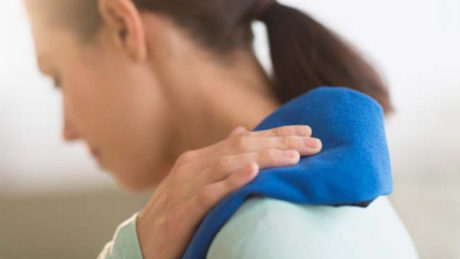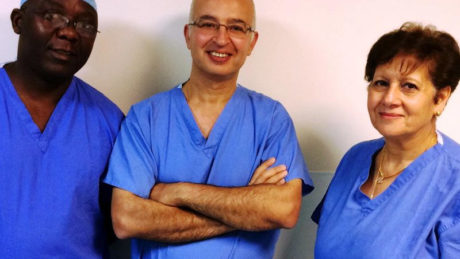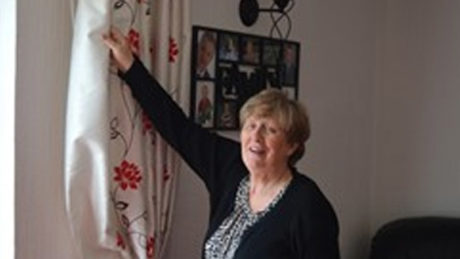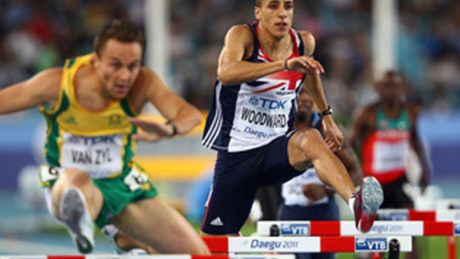Jeanette no longer shoulders immobility
We are delighted that a past patient wanted to discuss her experience and results following her reverse shoulder operation at Spire Parkway Hospital, Solihull.
Jeanette Bloxham suffered with a painful shoulder for over five years, which left her unable to use her right arm properly.
She was on the verge of being classed as disabled when she got referred to a local orthopaedic surgeon at Spire Parkway Hospital. There, she was advised to have a reverse shoulder operation. Now, Jeanette is free of pain and has very good movement in her arm.
Any restriction in movement caused by pain can alter how we go about our daily lives; but for Jeanette Bloxham, her shoulder discomfort had led to a significant change in how she lived her life.
With only about 10% use of her right hand, Jeanette struggled to perform day-to-day tasks like opening and closing a car door and even cooking proved challenging.
She said: “I got into the habit of holding my right arm into my chest just so I didn’t have to feel the pain. Trying to peel potatoes or cut vegetables was very hard. Even getting dressed was a major task I had to endure every day. Zips and buttons were very hard to do up. I could not even hug my children or grandchildren properly. It was very disheartening.
“I was sent for a course of physiotherapy and it was at this point that they suggested I seek the advice of an orthopaedic surgeon.”
Jeanette was referred to Mr Amir Salama at Spire Parkway Hospital and, after an MRI scan, he advised her that the best treatment for her condition was a reverse shoulder replacement.
Patients undergoing a reverse shoulder replacement operation tend to be over 70 years old; the tendon is damaged or completely worn away due to general wear and tear, something we all face with age. Compared to a standard shoulder replacement where a plastic ‘cup’ is placed into the shoulder socket and a metal ‘ball’ into the humerus (upper arm), the opposite happens for a reverse shoulder operation – the ball is fixed to the socket joint and the cup or plastic socket is attached to the upper arm bone (humerus).
Mr Amir Salama, orthopaedic surgeon at Spire Parkway, said: “The benefits of a reverse shoulder replacement operation include quick recovery rates, very little or no pain after treatment, and once healed, the patient has much improved mobility.”
Under the care of the specialist clinical staff at Spire Parkway Hospital, Jeanette’s operation took less than two hours.
After an overnight stay, Jeanette was discharged and given a post-operative programme, which included a series of physiotherapy sessions at the hospital, as well as exercises for her to complete while at home to build up Jeanette’s arm strength.
She added: “The operation has had such a positive impact on me. The team at Spire Parkway were absolutely marvellous. Thanks to them I have a more active lifestyle and I am no longer restricted to what I can now do – I have the use of my arm again.”
- Published in Health
Solihull doctors treat war victims in Sudan
A group of doctors flew out to the war-torn city of Juba in South Sudan to treat victims of the fighting
A group of Solihull medics have braved a war zone city in South Sudan to treat the victims of the fighting.
Consultant Anaesthetist Dr Samia Fayek, consultant orthopaedic surgeon Amir Salama and theatre nurse Kennedy Kaonga, who work together at the Spire Parkway Hospital in Solihull, have just returned from a week working in a hospital in the war-torn city of Juba
The group, who took drugs and medical equipment with them, carried out more than 70 operations, mostly on victims of the fighting between Government and rebel forces.
They worked 12-hours a day for seven days so they could operate on as many patients as possible.
The team also dealt with people walking in off the streets with fresh gunshot wounds.
Dr Fayek said: “When we arrived the hospital had been shut for weeks and people were desperate for treatment.
“They had gunshot wounds and fractures caused by explosions that they had been living with for months.
“The drug supplies were almost all gone but fortunately we had a supply of our own thanks to the Spire Parkway pharmacy and were able to put them to good use almost immediately.”
The trio were there as part of the St. Paul Coptic Medical Missions – a Christian organisation co-ordinating medical services in various African and Asian countries.
Mr Kaonga, who has previously worked in South Sudan as part of the Red Cross, described the conditions for people in Juba as ‘terrible.’
He said: “Some of the fractures had been untreated for so long that they set themselves – part of Mr Salama’s work was to try and get the bones back to their original shape. “As soon as we had finished one patient there was another to work on. It was tough work for all of us but very rewarding.”
Mr Salama added: It was a unique experience for all of us to be able to support those poor families with their injury and suffering. It was very satisfying and rewarding.
“My main aim was to teach the local doctors and get them involved in the surgery so that they can perform it again in the proper way after we leave.
“The facilities were the bare minimum to carry out any kind of surgery but hopefully it will improve as the country’s health minster got on board and promised a change.”
- Published in Health
Reverse shoulder success gives grandmum Virginia a big lift
At 71 years old Solihull grandmother Virginia Howell might not be handing out ‘high fives’ to show her delight but she is certainly all smiles when performing simple tasks such as hanging up her coat, following a special type of shoulder operation.
And playing with her youngest grandchild – four year old Amy – is a dream come true after years of barely being able to lift her right arm away from her side.
Virginia, who used to work with special needs children, first injured both of her shoulders in a fall back in 2002. She had rotator cuff repairs on both shoulders and, for several years, things seemed to be okay.
But gradually wear and tear on the right shoulder began to limit her arm movement and cause almost constant pain.
“I couldn’t sleep because of the pain. I couldn’t perform simple tasks that most people would take for granted – if I walked into a room carrying things in my left hand I couldn’t turn the light on because there was no way I could get my right hand above waist height,” she explained.
“Because I had already had two major shoulder operations I was worried there wouldn’t be anything else that could be done for me and thought I might have to spend the rest of my life on painkillers.”
Virginia, of Rowood Drive, was told she needed a shoulder replacement operation but, because of her previous injury, it would have to be done ‘in reverse’.
“The shoulder is a ‘ball and socket’ joint, explained Mr Amir Salama, Consultant Orthopaedic Surgeon at Spire Parkway Hospital in Solihull.
“In a normal shoulder the ball is formed at the top of the arm and this glides around a ‘socket’ on the shoulder blade.
“However, because Virginia’s socket was so worn and arthritic and had no rotator cuff tendons, we had to do things in reverse. I attached a metal ball to her shoulder blade and then I fitted a plastic socket at the top of her arm.”
A reverse shoulder replacement changes the centre of rotation of the shoulder and puts the outside shoulder muscles at an advantage. This allows them to lift the arm and replace the function of the torn and irreparable tendons in the rotator cuff.
Six weeks after surgery and Virginia is amazed at the range of movement she now has in her arm but, better than anything, the constant pain she had suffered for years is gone.
“It’s like I’ve been given a new lease of life,” she said. “I’m having great fun playing with young Amy and getting a full night’s sleep as well, I really can’t thank Mr Salama enough.”
- Published in Health
Solihull Sports Injury Clinic
Shoulder pain specialist to work from New Solihull Physiotherapy Clinic
Solihull physiotherapy clinic at Atlas Pain Relief Centre is to open a new shoulder pain clinic headed by Shoulder Consultant Mr Amir Salama. The new clinic will be a walking distance from Solihull town centre and Solihull Railway Station.
Physiotherapy for shoulder pain and post shoulder surgery is available from the Solihull Pain Relief Centre and manned by experienced Solihull State Registered HPC Physiotherapists.
Frozen Shoulder, rotator cuff tears, tendonitis and inflammation can be treated at the Atlas Pain Relief Centre and free parking is available for customers. MRI scans can be arranged and arthroscopic surgery should it be required is an option.
Solihull physiotherapist John Williams is excited about the opening of the new clinic and looks forward to helping all the local painful shoulder sufferers.
Registered with all private health insurance providers
- Published in Health

 Mr Amir Salama
Mr Amir Salama



